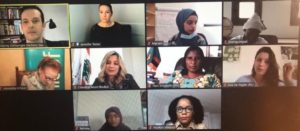Despite pandemic challenges, young leaders provide glimmers of hope in the fight to end child marriage
“The most important thing is protecting women against child marriage,” said Soanguimpali, a young mentor and advocate from Burkina Faso.
A simple statement that is too often not a reality for many young girls around the world.
Child and early forced marriage (CEFM) is a form of gender-based violence that perpetuates gender inequalities and is often driven by poverty. On top of being a human rights violation, it also has negative and lasting impacts on individuals, families, communities, and society.
Before the COVID-19 pandemic, Girls Not Brides estimated that roughly 12 million girls are married before the age of 18. That’s 23 girls every minute and nearly one every three seconds. Analysis by Save the Children found that the pandemic will lead to increases in these numbers, putting half a million more girls at risk. Some projections indicate that we may soon see the largest increase in CEFM rates in more than two decades if we don’t take urgent action.
This week, Save the Children, along with the United Nations Population Fund, UNICEF and the Governments of Canada and Zambia, came together to co-host “We Hear You!”
The inter-generational dialogue on child, early and forced marriage took place virtually on the side-lines of the 65th session of the Commission on the Status of Women (CSW-65). It centred on the voices of girls and provided young delegates with an opportunity to talk directly with leaders and decision-makers about the impact COVID-19 has had on their lives and the lives of young women in their communities.

Mariam, a Syrian refugee living in Lebanon, shared the story of a girl in her community who found herself divorced at 14. “This is not the story of a single girl. It’s a story of thousands of Syrian girls,” she said. Mariam said the pandemic intensified the many inequalities faced by refugee girls: “During COVID-19, girls don’t have the same opportunities as before, especially in education, as the quality of education is heavily affected. I’d like to see this changed.”
Save the Children has already sounded the alarm, warning that COVID-19-related school closures are threatening children’s right to education around the world. Without the safety net that schools provide, children – and girls in particular – are at heightened risk of exploitation, abuse and violence. With the option of education taken away, girls are also being forced into marriage and other forms of violence that will fundamentally change the trajectory of their lives.
Vanessa, a 22-year-old activist from Venezuela, told CSW delegates about the negative effects COVID-19 is having on education for girls in her country. When asked about one thing she would change if she could, she replied: “for girls to be able to go to school.” Vanessa urged the policymakers to focus on ensuring that all girls are able to attend school, “to learn, to have knowledge, to develop and to get ahead.”
Mariam and Vanessa reminded us all that girls know what works to solve the issues that affect them – including child marriage.
Rehima, house speaker of the children’s parliament in Ethiopia’s Gurage zone, said that she rejected a marriage that was being forced upon her at age 14. Now aged 17, Rehima is a strong and eloquent advocate for girls’ rights who is working to end child and early forced marriage in Ethiopia.
In Burkina Faso, Soanguimpali is also a community mentor, working at a safe space for girls. She has helped more than 200 girls gain better control of their lives through economic activities, including poultry farming and weaving. She even supported some of her mentees to become mentors themselves, creating a ripple effect throughout the region.
Rehima and Soanguimpali showed us that girls are driving real social change in their communities.
As Canada’s Deputy Minister for International Development Leslie MacLean put it: “Every time adolescent girls have the opportunity, they rise to the occasion. They are the real agents of change.”
Over the past decade, Save the Children has worked with policymakers as well as girls like Rehima, Soanguimpali, Mariam and Vanessa to accelerate progress towards ending child marriage. Despite the challenges presented by the pandemic, we have committed to keeping up the momentum and ensuring the issue remains on local, national and international agendas.
We do this through projects such as My Body. My Decision. My Rights: Reducing Child, Early and Forced Marriage in Sierra Leone and Burkina Faso. In partnership with Global Affairs Canada, the three-year project aims to reduce CEFM by addressing the underlying root causes that maintain gender inequality while championing more accessible and meaningful community alternatives. At the start of the project, girls told us they had no decision-making power over their futures. “In this community, girls have no influence over this decision when it comes to marrying, and they don’t allow us to talk about it.” (Girl, 15 years old, Sierra Leone*)
From the beginning of this partnership, we have prioritized girls’ voices. In light of the COVID-19 pandemic, we have renewed our commitment to listening. If we are to prevent progress from stalling – or, worse still, reversing – we have to listen to girls and support their right to safe and meaningful participation in political processes and in policy and programme design.
Natalia Kanem, executive director of the United Nations Population Fund, poignantly reminded us that “the road to gender equality is long, and we have miles to go.” But, she said, “We see glimmers of hope.” This week, Mariam, Vanessa, Rehima and Soanguimpali provided huge glimmers of hope for a future free from child, early and forced marriage.
*name undisclosed for protection.
By: Danny Glenwright, President and CEO of Save the Children Canada


